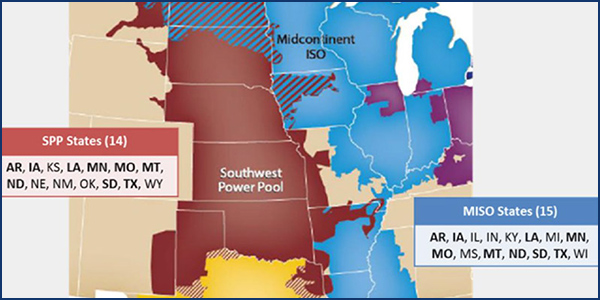FERC last week ordered a technical conference to investigate overlapping congestion charges imposed on pseudo-tie transactions between MISO and SPP.
The commission said it was displeased with MISO’s and SPP’s first round of briefs in the matter (EL17-89, EL19-60). Commission staff will set a date for the technical conference.
FERC last September said it would investigate the possibility of overlapping congestion charges between the grid operators after American Electric Power subsidiary Southwestern Electric Power Co. and the city of Prescott, Ark., complained. (See FERC Sets Briefings on MISO, SPP Congestion Fees.)
The RTOs have argued in briefs that though duplicative congestion charges are possible for their pseudo-tie transactions, mechanisms such as virtual transactions, financial transmission rights and firm-flow entitlements (FFE) counteract double charging. MISO has maintained that congestion charges on pseudo-tied generation with SPP do not require special Tariff remedies similar to those it took correcting double-charging with PJM, which it said, are less than those with SPP.
MISO-SPP pseudo-tied generation has “minimal impacts” on reciprocally coordinated flowgates, and generators can also pursue FFE allocations, MISO said. The RTO also said it models pseudo-tied loads in aggregate with the load at its commercial pricing nodes, “which prevents discretely quantifying the individual impact on pricing, settlement and congestion associated with the pseudo-tied load.”
SPP also said it doesn’t think it needs changes to its Tariff or its joint operating agreement with MISO, and said such changes would disturb FERC’s longstanding position that RTOs and utilities “are not required to offer special terms and conditions to accommodate pseudo-tie requests.”
The commission wasn’t satisfied with those characterizations.
“We find that the current record, after the briefing, is still not adequate for us to either (1) confirm that the mechanisms available to market participants are sufficient to remedy any potential for overlapping congestion charges, or (2) find that MISO and/or SPP must make changes to their JOA and/or individual tariffs,” FERC wrote.
The commission said the RTOs failed to answer when and how many times pseudo-tied generation imposed duplicative congestion charges and their total cost. It ordered another round of briefs and posed additional questions, including how the RTOs handle charges under the simultaneous binding of flowgates, MISO’s aggregation methods and a more detailed description of the grid operators’ FFE process and other existing offsetting mechanisms.
FERC also asked the RTOs to explore a grandfathered treatment of pseudo-tied loads, as SWEPCO suggested.



